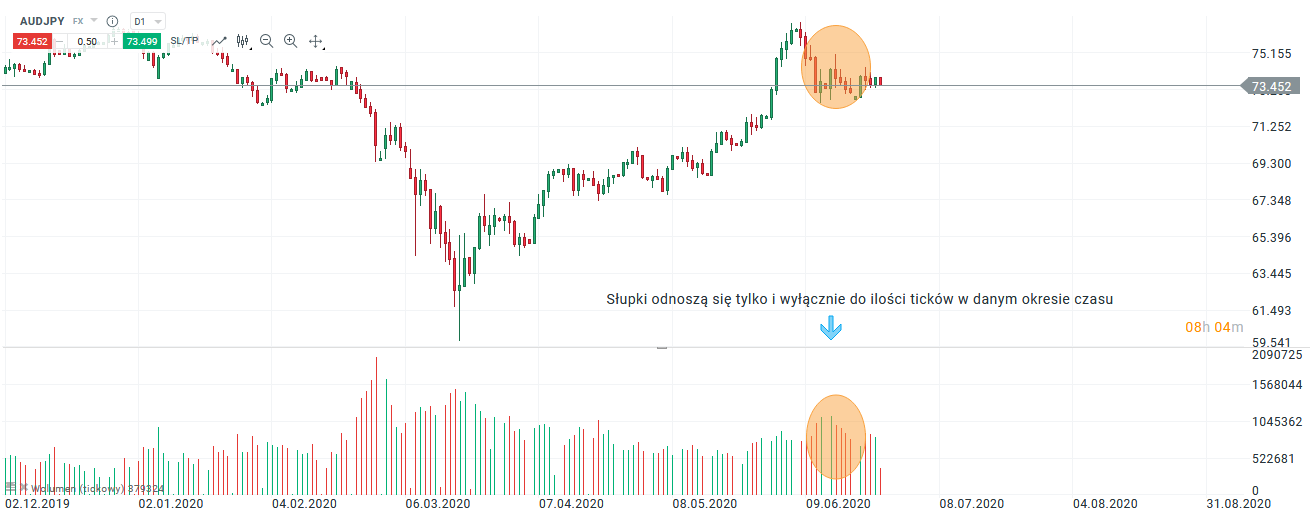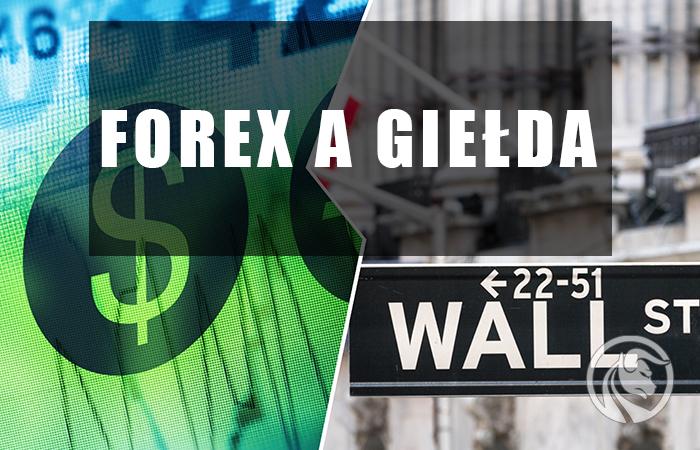Forex and the Stock Exchange - how they differ from each other
Forex and the Stock Exchange - how do they differ and what is better? Nowadays, financial markets are available to virtually anyone who has access to the Internet, smartphone and capital (and wants to invest it). The whole procedure is done remotely, without having to leave the house, regardless of whether we want to invest in US shares, French shares, currencies, agricultural goods or energy carriers.
By breaking down the general concept of the market, we can distinguish two basic groups: the stock exchange (regulated market) and Forex (decentralized market). Reflecting and searching for the answer to the question "How to invest effectively", you must first understand the basic principles of these markets and the differences that exist between them.
Stock Exchange
In a simplified sense, the stock exchange is a place where two sides of a transaction meet - those who buy and those who sell. Of course, each side wants to earn, and thus execute the transaction at the best price for them. These are actually very basic assumptions, but at this stage there is no need to make it any more complicated. It is about understanding basic relationships.
One of the key elements of the stock exchange is the fact that we are dealing with a regulated market that operates based on set standards. In addition, these transactions are settled centrally by the National Securities Register (KDPW) or its equivalent.
Speaking strictly about the stock exchange, the most important instruments that underpin this market are company shares. Bonds, futures and options are right behind them.
Projects
The action is an equity instrument. What does it mean? By purchasing shares of a given company, we gain certain "privileges", such as the right to dividend, participation in the general meeting or the right to subscribe for new issue shares. Purchase of shares can be understood as the purchase of a specific part of a given company that is available on the market.
treasuries
The bonds are classified as debt instruments. The issuing institution is owed to the creditor (bond buyer). They are often compared to the so-called reverse loan. Each bond has an interest rate expressed on an annual basis and a redemption date. The main purpose for which such instruments are issued is to raise capital for development or for the Treasury in the case of treasury bonds.
Options
The third range is options, in other words asymmetrical derivatives. Where did this term come from? In the case of options, two parties to the transaction expose different amounts of risk - this is where asymmetry emerges. The issuer (put option) takes on virtually unlimited risk, while the buyer (call option) limits it to a certain value. Of course, we have buy and sell options, which in practice gives us 4 possible combinations:
- call buy
- call sell,
- put buy
- put sell.
Kfutures transactions
In its original assumption, these are derivatives used to hedge exchange rate risk. Their value and valuation depends on another financial instrument called the underlying instrument. Each such contract has an expiration date with which it ceases to be quoted. All open positions are billed at the same time. Of course, the investor can close the position sooner. The catch is that you must find the other side of the transaction each time. The easiest way, if we have a long position, we must find a second buyer, while in the case of a short position, we need a second seller. Comparing it with previous groups, it is a relatively young instrument.
More information on futures contracts can be found in the series of articles:
Forex
Genesis currency market dates back to the first interbank operations where central banks exchanged currency. It cannot be denied that giants, such as JP Morgan, Goldman Sachs and UBS play the first violin on this market. Of course, there are also other institutions, hedge funds and individual investors. However, the last ones have the least importance in shaping courses.
A very important feature of the forex market is decentralization. This means that there is no one place where transactions are concluded. There is no need to cheat by now saying "forex", most mean the u platform currency broker. There are, of course, a whole bunch of this type of institution, but not everyone provides us with access to the same market.
We have three main types of brokers:
- Market Maker (MM),
- Straight Through Processing (STP),
- Electronic Communication Network (ECN)
There are many differences between particular types, but the most important one relates to the execution of individual orders.
Market Maker
In this model we are dealing with a kind of real market simulation. By opening a given position on the platform, the investor concludes a transaction with a broker who acts as a market maker. The broker secures the transaction in his own name (or at least should do it). Thanks to this solution and the fact that we are not dealing directly with the market here, some time ago it was possible to obtain a much higher level of leverage of transactions (it was popular 1: 500, but there were also much higher levels reaching even 1: 1000). The subject of this article does not apply strictly to brokers, but it should be noted that a significant disadvantage of this model is the possibility of a conflict of interest on the client-broker line. This is where the broker profit is the loss of the client, and vice versa. Often, MM brokers also introduce minimum distance limits for pending orders in relation to the market rate and other artificial / non-market conditions (but sometimes it is paradoxically beneficial for the client himself).
STP
The main assumption of this model is based on the fact that the broker is only an intermediary in our transactions and submits orders to the liquidity providers with whom it works. It is very important that he is not a party to the transaction, so there is no conflict of interest. The STP broker's remuneration is included in the currency spread (so-called markup), or is also added in the form of a commission on the value of the transaction.
ECN
The most desirable kind by traders. ECN brokers act in a similar way to STP in some respects. They are only intermediaries in transactions, but their main advantage is the fact that they centralize the market, gathering as many liquidity providers as possible in one place. The client of such a broker always has the best possible price and, as a rule, very low spread. Of course, there is also no conflict of interest here, because the broker only earns on transaction commissions. The disadvantages here may be slightly higher deposit requirements and a lower level of leverage, but in the era of current regulations and limiting leverage, this is no longer of such importance.
Find out more: All about types of Forex brokers - ECN, STP, MM
Forex and the stock market - the main differences
The main differences between the two title markets can be divided into several basic categories:
- transaction costs,
- volume,
- price movements,
- types of orders.
Transaction costs
Undoubtedly, the currency market looks better, where commissions represent only a fraction of the average cost on the stock market. In forex trading, commissions rarely exceed 0,0004% of the order value, and in some brokers even less than half of it.
It is not so colorful at the shares. Commissions of even 0,2 / 0,3% are not uncommon, and there are often so-called a minimum commission of not less than a certain amount. In terms of costs, it's also worth mentioning the leverage that is available on forex. In practice, in the currency market we can have a much smaller deposit and open a larger transaction. Of course, the lever is a double-edged sword, but this is a topic for another article.
Volume
The most important difference in relation to the volume is that we have the actual volume available on the stock exchange. Meanwhile, forex does not have such a possibility directly. Without a doubt, in this respect, we have a much better situation investing in the stock market. Having access to the full volume, we can read additional information from it that will present a real picture of the situation.
On platforms of course Forex brokers It's not so bad. You can find "additional" solutions, and sometimes also those provided by the broker itself - there are various types of indicators related to the volume (for example, such as the popular indicator Cumulative volume od XTB),
It must be admitted, however, that most offer only so-called tics based volume, i.e. individual price changes in a given time interval. In order to have access to the full real volume on forex, unfortunately we have to use other sources (in most cases paid) such as Reuters or Bloomberg.

Volumes indicator, AUD / JPY chart, D1 interval. Source: xNUMX XTB xStation
Price movements
Looking at this category, we need to raise the issue of liquidity. Unfortunately, not every instrument on the regulated market will have satisfactory liquidity for us, which will meet our expectations (speed of order execution, no slippage in execution at a given volume level, etc.). Unfortunately, reduced liquidity and high transaction costs are usually a poor connection. Of course, low liquidity will primarily affect more niche companies or instruments, but you have to remember that.
The situation with liquidity looks much better on forex. On most instruments, the average trader will not feel any problems. The risk is only extreme situations in the form of the publication of unexpected data or holiday periods. In the eyes of many investors, the Forex market creates itself as very volatile and risky. Contrary to appearances, a greater amplitude of fluctuations occurs on the stock market than on currencies. Practically at every session, even on the Polish WSE, you can find companies whose share price changes are over a dozen or even several dozen percent. Meanwhile, currencies rarely change their value by more than 1-2% per day.
So why the myth of above average fluctuations? Small movements were compensated by a high financial leverage, which does not occur on the stock market, and is much lower on futures than on FX. However, it should be remembered that the use of high leverage is not an obligation, but only a possibility.
Types of orders
Both on the regulated market and on the Forex market, we have many different types of orders to choose from. Of course, the basis for each order is the choice of the instrument and the type (buy or sell). Many types of orders also allow you to select and refine specific parameters such as the time of implementation or its method.
Order types - Forex and the stock market
| Forex | Stock Exchange |
| Market orders | Orders with a price limit |
| Limit orders | PEG orders |
| Take profit orders - TP | orders valid for closing - WNZ |
| Stop Loss Orders - SL | Orders with size disclosed - WUJ |
| Trailing stop orders - TS | Orders at any price - PKC |
| One cancels other - OCO | Orders valid until - WDC |
| Contigent orders | Cross orders |
| Good till cancel / time orders - GTC / GTT | Orders at market price - PCR |
Forex and the stock market - which is better?
Answering the question "Forex or stock market?" it is impossible to give an unequivocal answer, at least not without knowing the possibilities and expectations of a given investor. The choice will certainly be determined by our propensity for risk, horizon and investment objective, personal preferences, capital possessed and the strategy used.
Certainly, the element of financial leverage enabling the increase of potential profit in a short time and trade taking place 24 hours a day, brings us closer to the Forex market. Liquidity and advanced transaction platforms also speak for it. Meanwhile, the regulated market will enjoy the recognition of more conservative people, focused on a longer time horizon and conservative traders. We should remember, however, that the degree of investment risk ultimately depends only on us and the decisions we make.
Ultimately, it is not said that we must limit ourselves to a given market. The best idea, if our capital allows it, is to maximize diversification, i.e. to allocate funds to different markets and financial instruments. In the long run, regardless of the time horizon of our investments, this solution should bring us the maximum level of security in trade.






















![Forex Club – Tax 9 – Settle tax on a foreign broker [Download the Application] Forex Club - Tax 9](https://forexclub.pl/wp-content/uploads/2024/02/Forex-Club-Podatek-9-184x120.jpg?v=1709046278)
![Trading View platform – solutions tailored to the needs of traders [Review] trading view review](https://forexclub.pl/wp-content/uploads/2024/03/trading-view-recenzja-184x120.jpg?v=1709558918)
![How to connect your FP Markets account to the Trading View platform [Guide] fp markets trading view](https://forexclub.pl/wp-content/uploads/2024/02/fp-markets-trading-view-184x120.jpg?v=1708677291)
![How to invest in ChatGPT and AI? Stocks and ETFs [Guide] how to invest in chatgpt and artificial intelligence](https://forexclub.pl/wp-content/uploads/2023/02/jak-inwestowac-w-chatgpt-i-sztuczna-inteligencje-184x120.jpg?v=1676364263)


![WeWork – the anatomy of the collapse of a company valued at $47 billion [WeWork, part II] wework bankruptcy story](https://forexclub.pl/wp-content/uploads/2024/04/wework-bankructwo-historia-184x120.jpg?v=1711729561)
![Adam Neumann – the man who screwed up Softbank [WeWork, part AND] adam neumann wework](https://forexclub.pl/wp-content/uploads/2024/04/adam-neumann-wework-184x120.jpg?v=1711728724)





![How to transfer shares to another brokerage office [Procedure description] how to transfer shares to another brokerage house](https://forexclub.pl/wp-content/uploads/2024/03/jak-przeniesc-akcje-do-innego-biura-maklerskiego-184x120.jpg?v=1709556924)

![The most common mistakes of a beginner trader - Mr Yogi [VIDEO] Scalping - The most common mistakes of a beginner trader - VIDEO](https://forexclub.pl/wp-content/uploads/2024/03/Scalping-Najczestsze-bledy-poczatkujacego-tradera-VIDEO-184x120.jpg?v=1711601376)
![Learning patience: No position is also a position - Mr Yogi [VIDEO] Scalping - Learning patience - No position is also a position - VIDEO](https://forexclub.pl/wp-content/uploads/2024/03/Scalping-Nauka-cierpliwosci-Brak-pozycji-to-tez-pozycja-VIDEO-184x120.jpg?v=1710999249)
![When to exit a position and how to minimize losses - Mr Yogi [VIDEO] Scalping - When to exit a position and how to minimize losses - VIDEO](https://forexclub.pl/wp-content/uploads/2024/03/Scalping-Kiedy-wyjsc-z-pozycji-i-jak-minimalizowac-straty-VIDEO-184x120.jpg?v=1710336731)





![Learning patience: No position is also a position - Mr Yogi [VIDEO] Scalping - Learning patience - No position is also a position - VIDEO](https://forexclub.pl/wp-content/uploads/2024/03/Scalping-Nauka-cierpliwosci-Brak-pozycji-to-tez-pozycja-VIDEO-300x200.jpg?v=1710999249)












